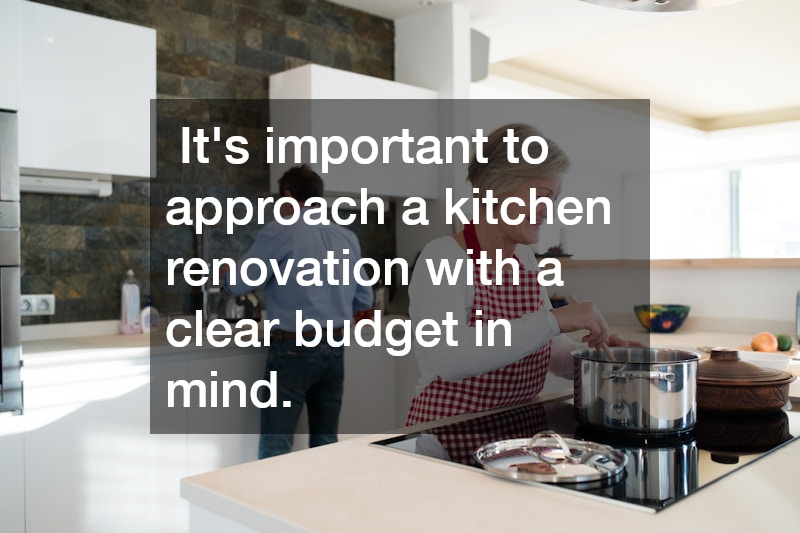Renovating a kitchen is a significant undertaking that can dramatically improve your home’s value and functionality. As one of the most essential spaces in a home, updating the kitchen can transform your daily routines and enhance your lifestyle. However, understanding the cost implications is crucial before initiating a renovation project.
You might be asking, “How much will my kitchen renovation cost?” While this question is common, the answer can vary greatly depending on several factors. These include the scope of your renovation, the materials you choose, and whether you intend to hire professionals or undertake some DIY projects.
It’s important to approach a kitchen renovation with a clear budget in mind. Doing so helps balance your aspirations with what is financially feasible and ensures you get the most out of your investment. In this article, we will delve into the various aspects that influence kitchen renovation costs to better prepare you for the journey ahead.
Understanding the Basics
Before diving into the specifics, it’s essential to understand the fundamental components of a kitchen renovation. A typical renovation might involve updating cabinets, countertops, appliances, lighting, and flooring. Each of these elements can significantly influence the overall cost.
For many homeowners, cabinets and countertops represent the most substantial expense in a kitchen remodel. Custom cabinets or high-end countertops can dramatically elevate the costs compared to stock options. Additionally, the choice between materials such as granite, marble, or laminate can also impact your budget.
Appliance upgrades are another crucial consideration. While top-of-the-line models can be appealing, they can also escalate the costs quickly. Weighing the need for modern efficiencies against budget constraints is an essential part of any successful kitchen renovation planning.
Budgeting for a Kitchen Renovation
Establishing a budget before you start your renovation is non-negotiable. A clearly defined budget will guide your decisions on which materials and renovations are realistic. Typically, a kitchen renovation might cost anywhere from $10,000 to over $50,000, depending on the extent of the changes.
To get started, you should list your primary renovation goals and prioritize them. This clarity allows you to allocate your funds more efficiently to the features and upgrades that matter most. Whether you choose to focus on high-quality cabinetry or advanced appliances could largely affect your financial plan.
It’s equally important to have a contingency fund, usually around 10-20% of your budget. This buffer can help manage unexpected expenses, such as hidden water damage or structural changes. Knowing you have this financial padding often brings peace of mind as you embark on transforming your kitchen space.
Factors Influencing Kitchen Renovation Costs
The cost of renovating a kitchen isn’t just determined by the tangible materials but also by other decisive factors. For example, your location can influence labor costs significantly, with urban areas generally exhibiting higher rates than rural counterparts. This discrepancy is crucial when planning your budget.
Timing can also play a role in influencing renovation costs. During peak construction seasons, contractors may charge premiums due to high demand. On the other hand, scheduling during off-peak times might present opportunities for discounts or more flexible pricing.
Moreover, the scale of your renovation project can dictate the overall expense. A minor update focusing on superficial design improvements will typically cost less than a full-scale demolition and reconfiguring of the kitchen layout. Assessing the level of renovation needed will help tailor your budget expectations realistically.
Saving Tips and Cost-Efficiency
There are myriad ways to reduce the financial impact when renovating a kitchen. One approach is to consider energy-efficient appliances which, although sometimes pricier initially, often save on long-term utility bills. This approach merges sustainability with cost-efficiency.
Another way to save is to keep the current kitchen layout intact while updating elements within the space. This can substantially cut down labor and material costs associated with changing plumbing and electrical configurations. Instead, focus your expenditures on visible changes that refresh the space aesthetically.
Finally, sourcing materials from local suppliers or opting for recycled materials can be economically and environmentally beneficial. Such choices can support local businesses while also providing unique options that lend a distinct character to your kitchen. Repurposing existing kitchen fixtures is another creative way to save on renovation costs.
Conclusion
A kitchen renovation can be a rewarding project that enhances both the beauty and function of your home. By comprehensively understanding the costs involved, you can make informed decisions that keep your remodel within budget while achieving your desired outcome. Remember that the investment into renovating a kitchen often translates directly into increased property value.
The process begins with setting a realistic budget, being mindful of the factors that can affect costs, and exploring cost-effective strategies to optimize your spend. With careful planning, your updated kitchen space can reflect personal taste and provide the utility and efficiency needed for daily living.
Ultimately, how much your kitchen renovation will cost depends on the choices you make. Investing time in research and planning could mean the difference between an underwhelming outcome and a breathtaking transformation. Regardless of your renovation path, focus on creating a kitchen that meets your family’s needs and adds joy to your home.
.








